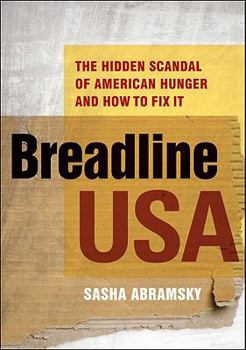Breadline USA: The Hidden Scandal of American Hunger and How to Fix It
Select Format
Select Condition 
Book Overview
Twenty-five million Americans-nearly 9 percent of the U.S. population-rely on food pantries. Another 13 million aren't linked to a food distribution network, and 14 million children are at risk of... This description may be from another edition of this product.
Format:Paperback
Language:English
ISBN:1936227096
ISBN13:9781936227099
Release Date:April 2011
Publisher:Routledge
Length:209 Pages
Weight:0.80 lbs.
Dimensions:0.6" x 6.0" x 9.1"
Customer Reviews
1 rating
All who are hungry. . . or jobless
Published by Thriftbooks.com User , 14 years ago
Cross-posted from www.jspot.org I just finished Sasha Abramsky's excellent Breadline USA: The Hidden Scandal of American Hunger and How to Fix It. Abramsky takes us inside food pantries, soup kitchens, and school lunch programs and introduces us to Americans struggling to feed themselves and their families. In a series of "interludes," Abramsky recounts his own adventures in hunger--while researching the book, he spends seven weeks living on a reduced food budget in order better to understand how it feels to be hungry. The funny thing about this book is: while it purports to be about hunger, it's actually about jobs. All of the people whom Abramsky profiles are victims of our country's broken labor system. He devotes a chapter to the way that Wal-Mart has driven down wages for the entire service industry, laments the decline in the real value of the minimum wage, and visits manufacturing workers who have lost their pensions in a multi-million dollar company buy-out. Other issues come up as well: as a result of rising gas prices (at the time that the book was published), work isn't always profitable, and the high cost of health care means that a single health crisis can plunge a family into debt. Come to think of it, these last two issues are about jobs as well. . . Rabbis and synagogue members often tell me that they have chosen, as a community, to work on hunger because of the prevalance of this issue in America, and because the issue is "not political." And it's easy to identify with hunger--all of us have experienced at least mild hunger pains, many of us are familiar with end-of-Yom Kippur nausea and weakness, and some of us grew up hearing the hunger memories of Holocaust survivors. Jewish sources point to hunger as the most obvious mark of poverty, and demand that each community care for its hungry members. It's true that hunger is way too common in the US, true that it's virtually impossible to find a fresh vegetable in many low-income neighborhoods, and true that far too many people depend on emergency food programs such as soup kitchens and food pantries. That said, hunger isn't really the issue. The US Conference of Mayors has found that, in 25 cities surveyed, fully 40% of those who access emergency food programs are employed. That is--having a job is no guarantee that one will be able to afford housing, health care, transportation, food, and other basics of life. While the price of food has gone up in the past few years, food remains a relatively small percentage of most families' budgets, compared to housing and health care. We are aware of the hunger crisis because many families choose to buy food last--lest failure to pay rent result in eviction, or failure to pay for certain health costs result in serious illness or death--and because emergency food is generally more available than emergency housing or health care. I'm not saying that we should stop paying any attention to hunger. I, personally, give money to my loc




